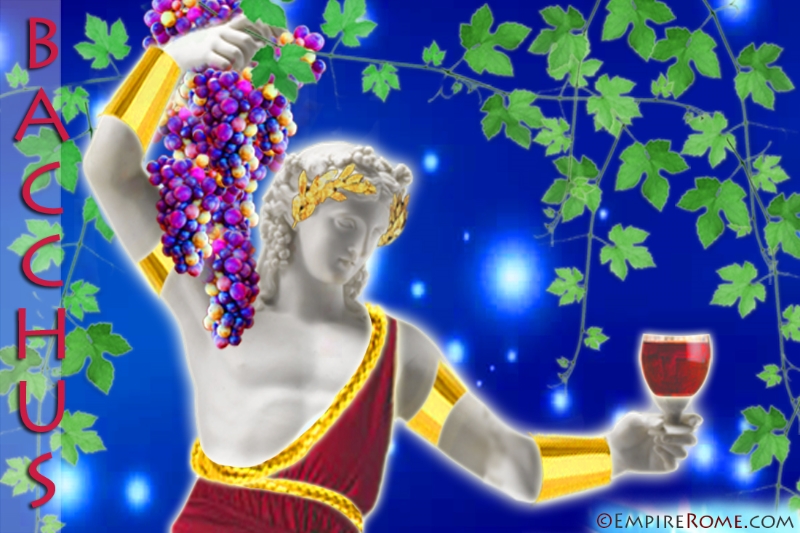
| BACCHUS “God of Wine” | |
| God of: | Wine, intoxication, relaxation, fertility, madness, agriculture, and theater |
| Type: | Major |
| Roman Name: | Bacchus |
| Greek Name: | Dionysys |
| Other Names: | Eleutherios (The Liberator) |
| Festivals: | March 16 and 17 |
| Shrine/Temple: | Temple of Bcchus in Baalbek in Lebanon |
Overview
Bacchus is a Greco-Roman god. After the 5th century B.C., Dionysus was known to the Greeks as Bacchus. He is known as Dionysus that came from Greek mythology. Bacchus was important to the Ancient Romans because he was the god of wine; a drink the Ancient Romans consumed with their daily meals. Bacchus in the ancient Greek culture was believed to have come from Zeus and Semele who was a mortal woman.
Bacchus is credited with discovering grape vines and cultivating them for wine. It is also believed that Bacchus traveled the world showing other people how to grow and cultivate grape vines and then making them in to wine. This is why Bacchus is credited with agriculture.
Bacchus is the god of wine, intoxication, and relaxation. He is also attributed with creating madness. Bacchus origins are believed to be the god that comes in an epiphany or heavenly moment. In the ancient Greco-Roman world, an epiphany referred to when a god would appear to a mortal.
Since many Romans and Greeks of ancient society revered Bacchus, he was also known as the Eleutherios which means the liberator. To Roman society this meant the freedom from ones typical self. Freedom came from the intoxication of wine. This intoxication would create madness, elation, and freedom to act however one felt. Bacchus’ mission as a god was to mix the music of the aulos, an ancient Greek musical instrument, and bring an end to trouble and concern in ancient society. This is also why he is credited with theatre. Theatre was a way for people to enjoy a play and be entertained.
Mythology
In Ancient Roman mythology, Bacchus is said to have had a mortal mother named Semele. Jupiter’s wife, Juno, found out that Jupiter had an affair with Semele and went into a jealous rage. She devised a plan to kill Semele. Juno did this by tricking Semele to ask Jupiter to reveal his true godly nature to her. In revealing his true nature to Semele, Juno knew that the godly light from Jupiter would burn Semele up and kill her. Semele made Jupiter promise that he would fulfill whatever she asked him, and he agreed. At Semele’s request, Jupiter reluctantly revealed himself in all his godliness and Semele was destroyed by Jupiter’s light. Semele was pregnant with Bacchus at the time Jupiter revealed himself to her. Jupiter did not want his son to die so he took Bacchus and stitched him into his thigh so he would be safe until he was ready to be born. Bacchus became the last of the 12 Olympian gods.
Festivals and Worship
Bacchus’ festival was held on March 16 and 17 known as the Festival of Bacchanalia. This festival took place at Aventine Hill in Ancient Rome. Bacchanalia was a secret festival attended by only by women; however, men were later granted to celebrate Bacchanalia as well. To this day not much is known about Bacchanalia because of its secrecy. What is known about Bacchanalia is that it originated around 200 B.C. and the festival celebrations became infamous for their outrageous behaviors. This could be due to the fact that Bacchus, being the god of wine, encouraged followers to become very intoxicated during celebrations. This intoxication then led to festival goers to become unruly, portray extreme sexual behavior, and other unlawful type of activities. This unruly behavior soon led to the Ancient Roman senate who issued a declaration in 186 B.C. to remove Bacchanalia from being celebrated.
Bacchus worshipers were satyrs, satyresses, and maenads. A satyr (male) satyress (female) was a half-human half-goat. They usually had the ears, tail, and feet of goats mixed in with human characteristics. Maenads were known as untamed women that would dance during Bacchanalia. Their name means “raving ones” as they would get into an ecstatic frenzy from drinking wine and dance feverishly to worship Bacchus.
Duties, Attributes, and Symbols
Bacchus’ symbol was the thyrsus which was a staff or giant fennel covered with ivy vines and leaves wound with a flat band topped with a pine cone. His symbol was also grapes and leopard skin. Plants attributed to Bacchus are twirling ivy and grape vines.
Fun Facts
Bacchus was the only half-mortal god in Olympia.
Bacchus was the last of the twelve Olympian gods.
Bacchus’ reputation as a happy fun party god is kept alive today as he is portrayed in literature and films. Bacchus’ character is usually shown as a happy fat drunken god.
Click here to return to Ancient Roman Gods and Goddesses list.

